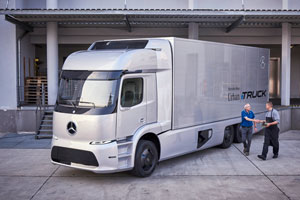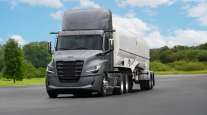Daimler Shows Three Electric Concept Vehicles Focused on Urban Transportation

HANOVER, Germany — Daimler Trucks focused on improving urban transportation during its media event ahead of the IAA commercial vehicles show, presenting three electric concept vehicles.
The Mercedes-Benz Urban eTruck, Vision Van and Future Bus will make urban transportation “more efficient, safer and connected,” said Wolfgang Bernhard, head of Daimler Trucks' global truck and bus division.
"In the coming 10 years, more will change in our vehicles than in the past 120 years," Bernhard said.
The result, he said, “is making cities a better place for everyone.” That is critical, he added, because studies show an estimated 70% of the world’s population will resides in urban areas by 2050.
MORE ABOUT IAA: Neil Abt on Sirius XM's Road Dog News, 9/26, 2 p.m. EDT
Daimler’s event at a power plant facility here Sept. 20 included about 600 guests from 36 countries. It took place the evening before the start of IAA, the biennial truck show considered the most technologically advanced commercial vehicle event in the world.
At the last IAA, in 2014, Daimler showcased its autonomous Mercedes-Benz Future Truck, which Bernhard called a vision for longhaul transport.
 Daimler
Daimler For this show, however, the company zeroed in on a three-part strategy to address the growing need to improve efficiency and environmental aspects of transportation for cities around the globe.
Bernhard said the Urban eTruck offers a range of 200 kilometers (124 miles) and utilizes a lithium-ion type battery. It generates zero emissions and made little noise during a short outdoor demonstration.
It continually monitors the battery power and delivery route, and has the ability to operate in three modes to provide additional power or reduce torque if there is unexpected traffic. It would take no more than two hours to fully charge the battery, and drivers would have the ability to schedule an intermediate charging at a delivery stop to gain additional energy.
 Daimler officials are surrounded by the media in Hanover, Germany. (Neil Abt/Transport Topics)
Daimler officials are surrounded by the media in Hanover, Germany. (Neil Abt/Transport Topics) The Vision Van is part of an expanded strategy to provide enhanced last-mile delivery, which “is the majority of the total delivery cost,” said Volker Mornhinweg, head of the Mercedes-Benz van division.
The futuristic van features a fully automated cargo space, integrated drones for autonomous air deliveries and joystick control. It, too, is emission-free and has a virtually silent electric drive system to allow for late night same-day deliveries in residential areas.
Besides displaying the van, Mornhinweg shared details of the company’s “adVANce” initiatives as drones flew overhead and small robots exited the van, simulating actual deliveries.
Mornhinweg said Daimler plans on offering an electric van in 2018.
Meanwhile, the Future Bus utilizes “CityPilot,” an adaptation of the Highway Pilot system that is the basis of Daimler’s autonomous trucks. The company said CityPilot can drive safely through intersections equipped with traffic lights, detect pedestrians on the road and automatically brake in response to them. It also can drive up to bus stops, open and close doors automatically, and even drive through tunnels.
In closing remarks, Bernhard acknowledged the price tag for the eTruck “would be considerably higher than that of a conventional truck.”
However, he said in the coming years production costs would fall significantly and batteries will become more affordable. Additionally, he said higher purchasing costs could be offset by lower operating and maintenance costs, noting that electricity is about 40% less expensive than diesel.




